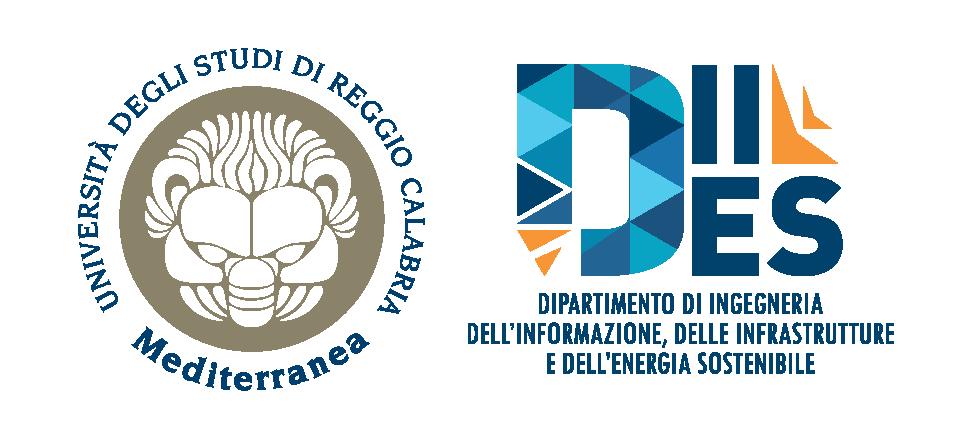8-9 March 2018, Reggio Calabria, Italy
Samir Adly, Université de Limoges, FR
 Samir Adly received a Master degree in Mathematical Engineering (1992) and a PhD in Applied Mathematics (1995), both from the University of Limoges (France). From 1997 to 2006 he was associate professor and from 2006 till now he is full professor of mathematics at University of Limoges. His research interests focus on theoretical and algorithmic issues related to variational inequalities, complementarity problems, optimization, nonsmooth dynamical systems, variational analysis and its applications. He is actually Director of the Mathematics and Computer Science Department (DMI) of the institute of research XLIM (UMR-CNRS 7252). He is also the Head of the team MOD "Modeling, Optimization, Dynamics" of the department DMI and is Responsable of the Master degree ACSYON. He serves as general chair of numerous conferences and has been invited and keynote speaker in several international conferences. Professor Adly has published more than 60 refereed journal articles and book chapters.
Samir Adly received a Master degree in Mathematical Engineering (1992) and a PhD in Applied Mathematics (1995), both from the University of Limoges (France). From 1997 to 2006 he was associate professor and from 2006 till now he is full professor of mathematics at University of Limoges. His research interests focus on theoretical and algorithmic issues related to variational inequalities, complementarity problems, optimization, nonsmooth dynamical systems, variational analysis and its applications. He is actually Director of the Mathematics and Computer Science Department (DMI) of the institute of research XLIM (UMR-CNRS 7252). He is also the Head of the team MOD "Modeling, Optimization, Dynamics" of the department DMI and is Responsable of the Master degree ACSYON. He serves as general chair of numerous conferences and has been invited and keynote speaker in several international conferences. Professor Adly has published more than 60 refereed journal articles and book chapters.
Quasistatic evolution variational inequalities in the framework of Moreau’s Sweeping process
In this talk, we study a new variant of the Moreau's sweeping process with velocity constraint. Based on an adapted version of the Moreau’s catching-up algorithm, we show the well-posedness (in the sense existence and uniqueness) of this problem in a general framework. We show the equivalence between this implicit sweeping process and a quasistatic evolution variational inequality. It is well-known that the variational formulation of many mechanical problems with unilateral contact and friction lead to an evolution variational inequality. As an application, we reformulate the quasistatic antiplane frictional contact problem for linear elastic materials with short memory as an implicit sweeping process with velocity constraint. The link between the implicit sweeping process and the quasistatic evolution variational inequality is possible thanks to some standard tools from convex analysis and is new in the literature.
Talk based on the following:
[AH] S. Adly and T. Haddad, An implicit sweeping process approach to quasistatic evolution variational inequalities. To appear in SIAM Journal on Mathematical Analysis.
Gianluigi Greco, Università della Calabria, IT
 Gianluigi Greco is an Associate Professor of Computer Science at University of Calabria. He was a visiting PhD student at the Vienna University of Technology (2003) and a visiting researcher at the Oxford University Computing Laboratory (2006). He was a research associate at the ICAR institute of the Italian National Research Council (2011 and 2012) and Invited Professor at the LAMSADE Department of the University of Paris-Dauphine (2014). His research is focused on the theoretical foundations of Artificial Intelligence and Game Theory. In these areas, he has co- authored more than 130 publications in leading international conferences and journals. He has served as a program committee member in more than 50 international conferences and workshops. In 2008, his work “Pure Nash Equilibria: Hard and Easy Cases” received the IJCAI-JAIR Best Paper Award. In 2009, he received the Marco Somalvico Award by the Italian Association for Artificial Intelligence. In 2014, he received a Kurt Gödel Research Prize Fellowship in the area of Logical Foundations of Artificial Intelligence, which was awarded by the Kurt Gödel Society.
Gianluigi Greco is an Associate Professor of Computer Science at University of Calabria. He was a visiting PhD student at the Vienna University of Technology (2003) and a visiting researcher at the Oxford University Computing Laboratory (2006). He was a research associate at the ICAR institute of the Italian National Research Council (2011 and 2012) and Invited Professor at the LAMSADE Department of the University of Paris-Dauphine (2014). His research is focused on the theoretical foundations of Artificial Intelligence and Game Theory. In these areas, he has co- authored more than 130 publications in leading international conferences and journals. He has served as a program committee member in more than 50 international conferences and workshops. In 2008, his work “Pure Nash Equilibria: Hard and Easy Cases” received the IJCAI-JAIR Best Paper Award. In 2009, he received the Marco Somalvico Award by the Italian Association for Artificial Intelligence. In 2014, he received a Kurt Gödel Research Prize Fellowship in the area of Logical Foundations of Artificial Intelligence, which was awarded by the Kurt Gödel Society.
Nash Equilibria under the lens of Computational Complexity
The study of computational issues related to Nash equilibria has attracted much attention in the last decade within the Computer Science community. The talk will present some relevant results in this area, by focusing on strategic games and by considering mixed equilibria as well as pure and Bayesian ones. The exposition will be accessible to a broad audience and, in fact, basic notions of computational complexity will be presented, too. For the sake of concreteness, recent applications of Nash equilibria for analysing the interactions that emerge over social environments (e.g., Twitter of FaceBook) will be also discussed, again by focusing not only on modelling issues, but by also paying attention at their algorithmic underpinnings.
Anna Nagurney, University of Massachusetts Amherst, US
 Anna Nagurney is the John F. Smith Memorial Professor in the Department of Operations and Information Management in the Isenberg School of Management at the University of Massachusetts Amherst. She is also the Founding Director of the Virtual Center for Supernetworks and the Supernetworks Laboratory for Computation and Visualization at UMass Amherst. She is an Affiliated Faculty Member of the Department of Civil and Environmental Engineering and the Department of Mechanical and Industrial Engineering at UMass Amherst. She received her AB, ScB, ScM, and PhD degrees from Brown University in Providence, Rhode Island. She devotes her career to education and research that combines operations research / management science, engineering, and economics. Her focus is the applied and theoretical aspects of network systems, particularly in the areas of transportation and logistics, critical infrastructure, and in economics and finance.
Anna Nagurney is the John F. Smith Memorial Professor in the Department of Operations and Information Management in the Isenberg School of Management at the University of Massachusetts Amherst. She is also the Founding Director of the Virtual Center for Supernetworks and the Supernetworks Laboratory for Computation and Visualization at UMass Amherst. She is an Affiliated Faculty Member of the Department of Civil and Environmental Engineering and the Department of Mechanical and Industrial Engineering at UMass Amherst. She received her AB, ScB, ScM, and PhD degrees from Brown University in Providence, Rhode Island. She devotes her career to education and research that combines operations research / management science, engineering, and economics. Her focus is the applied and theoretical aspects of network systems, particularly in the areas of transportation and logistics, critical infrastructure, and in economics and finance.
She is author or co-author of 12 books and more than 200 papers.
Game Theory Models of Cybercrime and Cybersecurity Investments Under Network Vulnerability
The effects of cyberattacks are being felt across the globe in multiple sectors and industries. The damages incurred include direct financial damages as well as reputation issues, the loss of business, the inability to provide the expected services, opportunity costs, and the loss of trust. The world economy sustained over $460 billion in losses from cyberattacks in 2016 alone.
In this talk, I will first describe a predictive analytical multiproduct network economic model of cybercrime in financial services in which the hacked products are perishable in that their ``value" deteriorates over time. I will then discuss our research on game theory models for cybersecurity investments and network vulnerability when firms compete and when they cooperate in terms of information sharing. Algorithms and computational results for both classes of models will be presented and discussed and case studies presented in retail and energy sectors with extensive sensitivity analysis results that demonstrate the benefits of cooperation. I will conclude with recent research on cybersecurity and supply chains.
Marcello Pelillo, Università Ca'Foscari Venezia, IT
 Marcello Pelillo is a Professor of Computer Science at the University of Venice, Italy, where he directs the European Centre for Living Technology and leads the Computer Vision and Pattern Recognition group, which he founded in 1995. He held visiting research positions at Yale University (USA), McGill University (Canada), the University of Vienna (Austria), York University (UK), the University College London (UK), and the National ICT Australia (NICTA) (Australia). He serves (or has served) on the editorial boards of IEEE Transactions on Pattern Analysis and Machine Intelligence, IET Computer Vision, Pattern Recognition, Brain Informatics, and is on the advisory board of the International Journal of Machine Learning and Cybernetics. He has initiated several conferences series as Program Chair (EMMCVPR, IWCV, SIMBAD) and will serve as a General Chair for ICCV 2017. He is (or has been) scientific coordinator of several research projects, including SIMBAD, a highly successful EU-FP7 project devoted to similarity-based pattern analysis and recognition.
Marcello Pelillo is a Professor of Computer Science at the University of Venice, Italy, where he directs the European Centre for Living Technology and leads the Computer Vision and Pattern Recognition group, which he founded in 1995. He held visiting research positions at Yale University (USA), McGill University (Canada), the University of Vienna (Austria), York University (UK), the University College London (UK), and the National ICT Australia (NICTA) (Australia). He serves (or has served) on the editorial boards of IEEE Transactions on Pattern Analysis and Machine Intelligence, IET Computer Vision, Pattern Recognition, Brain Informatics, and is on the advisory board of the International Journal of Machine Learning and Cybernetics. He has initiated several conferences series as Program Chair (EMMCVPR, IWCV, SIMBAD) and will serve as a General Chair for ICCV 2017. He is (or has been) scientific coordinator of several research projects, including SIMBAD, a highly successful EU-FP7 project devoted to similarity-based pattern analysis and recognition.
Prof. Pelillo has been elected a Fellow of the IEEE and a Fellow of the IAPR, and has been appointed IEEE Distinguished Lecturer (2016-2017 term). His Erdös number is 2.
Grouping Games: Finding Clusters in Graphs, Digraphs and Hypergraphs
Clustering refers to the process of extracting maximally coherent groups from a set of objects using pairwise, or high-order, similarities. Traditional approaches to this problem are based on the idea of partitioning the input data into a predetermined number of classes, thereby obtaining the clusters as a by-product of the partitioning process. In this talk, I'll provide a brief review of recent work done in my group which offers a radically different view of the problem. In contrast to the classical approach, in fact, we attempt to provide a meaningful formalization of the notion of a cluster and we show that game theory offers an attractive and unexplored perspective that serves well our purpose. To this end, we formulate the clustering problem in terms of a non-cooperative “clustering game” and show that a natural notion of a cluster turns out to be equivalent to a classical (evolutionary) game theoretic equilibrium concept. We prove that the problem of finding the equilibria of our clustering game is equivalent to locally optimizing a polynomial function over the standard simplex, and we provide a discrete-time dynamics to perform this optimization, based on the Baum-Eagon inequality. The proposed grouping framework, which has already found applications in a variety of application fields, including computer vision, bioinformatics, security and video surveillance, etc., is general and can be applied to weighted graphs, digraphs and hypergraphs alike.




